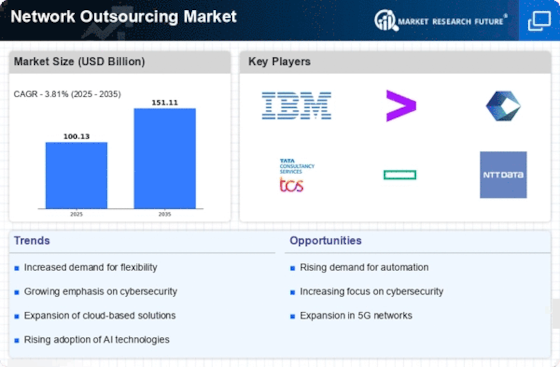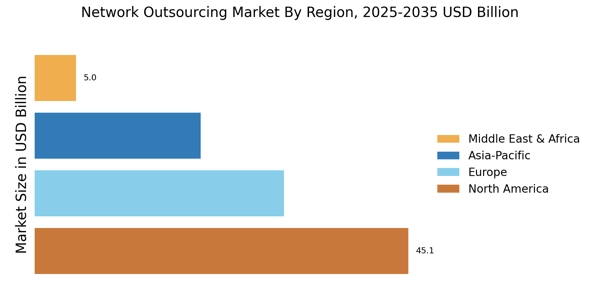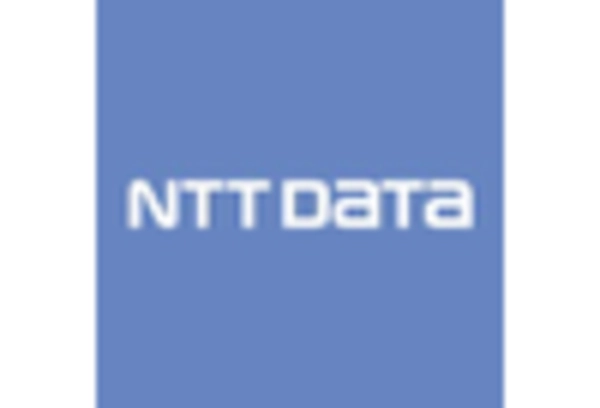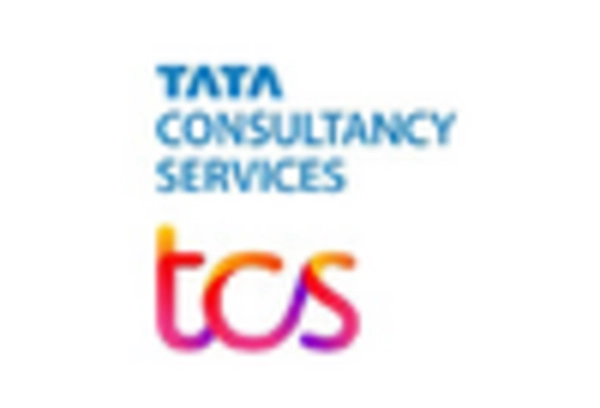Rising Demand for Cost Efficiency
The Network Outsourcing Market experiences a notable surge in demand for cost efficiency among enterprises. Organizations are increasingly seeking to reduce operational costs while maintaining high-quality services. Outsourcing network functions allows companies to leverage specialized providers who can deliver services at a lower cost than in-house operations. According to recent data, businesses that adopt outsourcing strategies can save up to 30% on their network management expenses. This trend is particularly pronounced in sectors such as telecommunications and IT, where the need for robust network infrastructure is paramount. As companies strive to optimize their budgets, the Network Outsourcing Market is likely to witness continued growth driven by this imperative for cost reduction.
Expansion of Cloud Computing Services
The proliferation of cloud computing services significantly influences the Network Outsourcing Market. As organizations migrate to cloud-based solutions, the demand for outsourced network management services escalates. Cloud providers often require extensive network capabilities to ensure seamless connectivity and performance. This shift has led to an increase in partnerships between cloud service providers and network outsourcing firms, facilitating enhanced service delivery. Market data indicates that the cloud computing sector is projected to grow at a compound annual growth rate of over 15% in the coming years. Consequently, the Network Outsourcing Market stands to benefit from this expansion, as businesses seek to integrate their network operations with cloud solutions.
Growing Focus on Core Business Functions
The Network Outsourcing Market is witnessing a growing focus among organizations on their core business functions. Companies are increasingly recognizing the value of outsourcing non-core activities, such as network management, to specialized providers. This strategic shift allows businesses to concentrate on their primary objectives while leveraging the expertise of outsourcing partners to handle complex network operations. Market data suggests that organizations that outsource their network functions can enhance their overall efficiency and agility. As the competitive landscape intensifies, the trend towards outsourcing non-core functions is expected to accelerate, thereby propelling growth in the Network Outsourcing Market.
Technological Advancements in Networking
Technological advancements in networking play a pivotal role in shaping the Network Outsourcing Market. Innovations such as software-defined networking (SDN) and network function virtualization (NFV) are transforming how organizations manage their network infrastructure. These technologies enable more flexible and efficient network operations, prompting businesses to seek outsourcing solutions that can effectively implement and manage these advancements. The integration of AI and machine learning into network management further enhances service delivery, allowing for predictive maintenance and improved performance. As organizations increasingly adopt these technologies, the Network Outsourcing Market is likely to expand, driven by the need for specialized expertise in managing advanced networking solutions.
Increased Regulatory Compliance Requirements
The Network Outsourcing Market is significantly impacted by the rising regulatory compliance requirements across various sectors. Organizations are compelled to adhere to stringent regulations regarding data protection, privacy, and network security. This has led to a growing reliance on outsourcing partners who possess the expertise to navigate complex compliance landscapes. For instance, industries such as finance and healthcare face rigorous standards that necessitate specialized knowledge in network management. As a result, the demand for outsourcing services that ensure compliance is expected to rise. Market analysis suggests that companies investing in compliant network outsourcing solutions can mitigate risks and enhance their operational integrity, thereby driving growth in the Network Outsourcing Market.

















